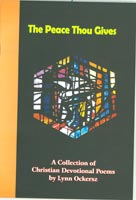It is the urgency of experience, the felt need to express a surge of reaction to the Divine as well as the diurnal that gives distinction and emotive force to Lynn Ockersz’s poetry. The lines spring not as varta-kavi that record a moment of whimsy or pathos, nor from cerebral choice, but anvilled in the heat and stress of strenuous active engagement in confronting his inner self or contemporary society.
Harry Potter mesmeric lore thrown into
War casualty tolls and cricket scores
Political gossip and superstar shows
(The Poor Man’s Cocktail)
The peace of the graveyard grates on the ear
It is not the Peace of Love Thou holds so dear
But an eerie stillness born of fear
Welling in hearts by worldly
Might brought to heel
(As the Gun-Smoke Settles)
The poet’s ear that makes a line echo and hold, not pass through a reader’s mind, an awareness of the way language works is evident: to that extent, Ockersz’s response to more than four years of being immersed in literature and familiarizing himself both as a student and Visiting Lecturer with the work of Donne, Herbert and Eliot shows. It accounts for a seasoned scholar’s delight in the first manifestation of Ockersz’s abilities.
“Lyn Ockersz’s Christian religious poetry in Flame and Sparks (2003) represents a new element in Sri Lankan poetry in English … Ockersz’s poetry is fresh, strong and convincing and is also free of echoes of well-known Western religious poets”.
D.C.R.A. Goonetilleke in Sri Lankan English Literature and the Sri Lankan People 1917-2003 also identifies the distinctive quality of Ockersz’s early poetry succinctly. “Its essence is controlled thought, an epigrammatic balancing of ideas”.
It was this fusion of intense feeling and equable views that gave both force and poise to the poems in Flame and Sparks but a new note has developed in his new collection, The Peace Thou Gives – more confident and consequently, occasionally less solemn, capable of using a lighter tone to accommodate the sardonic and satirical vein. Where the poem centres on religion, however, the fervour is undiminished. One may not be able to accept Ockersz’s tenets but the deep sincerity manifestly ‘felt in the blood and felt along the heart’ to quote Wordsworth’s irreplaceable line cannot but make the reader share his feelings at the moment of reading, as is the case with Maker and the Mould and The Peace Thou Gives.
Flame and Sparks voiced an impressive commitment to social justice; the preface to The Peace Thou Gives states “I hope I have succeeded … in giving to my poems a substantial local socio-political dimension and topicality”.
Far from being ‘an artificial implant’, the element which another critic perceptively identified as ‘social responsibility’, impels Ockersz to express himself in poetry as well as the religious impulse to glorify his God. In the poet’s vision the two are inseparable. The true measure of Ockersz’s achievement lies in his ability to convey his sense of the operation of the Divine Will to readers whose understanding of Christianity is derived solely from English literature, through the medium of language and rhythm. Yeats wrote of “the craft of verse” and even if Ockersz had not significantly used the word “crafted” in his preface, it is apparent that he is not of the hit-or-miss school of poetasters. Clarity of imagery, firmness of structure emphasized by an unforced and unobtrusive use of rhyme and an awareness that “the ear is the true reader” gives many of his poems the power of lodging in the memory, for instance:
The Miscarriage
The world comes crashing down on the powerless
Because some trembling hands cannot weigh evenly
And obey the Call of Conscience coming from Eternity
But would prefer to heed
Hades cold prompting
And choose safety of self,
Position and pelf …
Ghost Writer too has its appeal, as Ockersz deftly playing on a term older than Holy Spirit, the Holy Ghost unhesitatingly and unerringly places a small plain word that is full of meaning at a prominent point:
Am I not like Moses who felt
Small before Thy Writ
But Thou his spirit did lift
I too look to Thee O giver of grit.
Embellished as it is with miniature pictures not always entirely in keeping with the starkness of some of the poems, but charming in themselves, the slim book is likely to prove a popular Christmas gift to favoured friends because of its furtherance of their faith. For those who may echo Yeats:
“Homer is my example and his unchristened heart”
it may promote discussion of societal dysfunction or the dynamics of poetry. |


